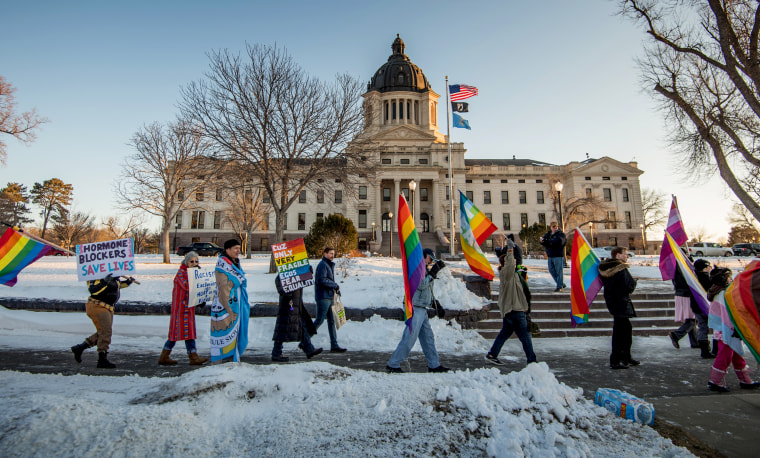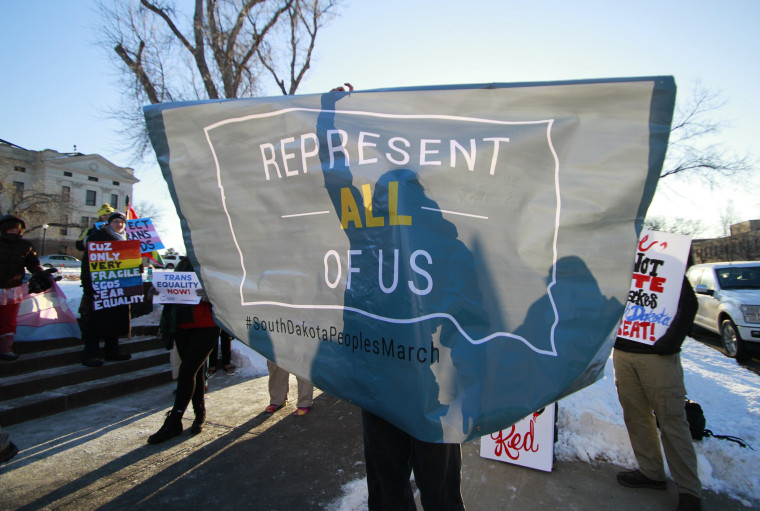Mark Geary had a lot of hands to shake on Monday. Geary drove to the South Dakota Capitol in Pierre to hear lawmakers debate a bill that would prevent young people under the age of 16 — like his child, Aerin — from receiving medication or surgery to affirm their gender identity. The Senate Health and Human Services Committee voted 5-2 to punt SB 1057 to the 41st day of the legislative session. The session is only 40 days long, marking the bill effectively dead.
Geary made Aerin, who is 15, stay home for the hearing because he was worried about what was going to happen. He expected the worst, fearing that families like his would soon be forced to make an even longer drive to a neighboring state to get their children the care they — and growing list of experts in the medical community — say they need. Instead he was met with a “wave of relief” as the votes were tallied.
“I just felt such gratitude for those five senators,” he told NBC News. “I shook a couple of their hands, and I was almost crying. I don’t cry very easily.”
"I'm not glad that we went through this, but the unintended consequence is that it has created a space where LGBTQ people have stood up and said, 'This is our state, too.'"
Libby Skarin, ACLU of South Dakota
The bill is at least the third time in five years that legislation opposed by transgender advocates has been defeated in South Dakota after passing one or both state houses. Former Gov. Dennis Daugaard, a Republican, vetoed a “bathroom bill” in 2016 after it passed the House by a decisive 58-10 vote and the Senate by a slimmer five-vote margin. Last year, a bill forcing trans student athletes to play on sports teams that align with the sex they were assigned at birth, opposed to their gender identity, missed making it to the governor’s desk by just one vote.
LGBTQ advocates see a pattern in the legislation’s defeat. Although South Dakota, a conservative stronghold, has long served as a testing ground for anti-LGBTQ proposals, these bills inch a little further away from passing every year. After nearly becoming the first state in the nation to enact a law targeting trans people four years ago, SB 1057 couldn’t even make it to the Senate floor in 2020.
“As Americans have the opportunity to get to know LGBT people, they come to support us,” Kasey Suffredini, CEO of Freedom for All Americans, told NBC News. “We saw it with marriage, we saw it with bathroom bans, and we’re seeing it now in the context of attacking transgender young people. When they see that lawmakers are introducing these bills, people show up at the Capitol, they lobby against them, and the bills die — and they die quicker every year.”
‘A race against the clock’
South Dakota is one of at least nine states this year that have attempted to punish or even criminalize doctors for providing transgender health care to minors. Proposed legislation in states like Oklahoma and Colorado would fine medical providers or even sentence them to jail time for offering trans-affirming medical care to young people, while bills in Illinois and and South Carolina target them with loss of licensure. Two states — Missouri and New Hampshire — go so far as to classify gender-affirming treatment as “child abuse.”
South Dakota Republican Rep. Fred Deutsch, the author of the state’s transgender health bill — which initially slapped doctors with a felony for providing trans health care to minors, including puberty blockers and cross-sex hormones — said his proposal was necessary to prevent “criminal acts against vulnerable children who are too young to understand the impact.” But following national backlash against the measure, Deutsch attempted to introduce an amendment during Monday’s hearing that would allow people to file a civil lawsuit against their doctors if they later regret transitioning, in lieu of felony charges.

Libby Skarin, policy director of the ACLU of South Dakota, said Deutsch’s last-ditch attempt to save face “didn't really change the bottom line.”
“It would still ban doctors and parents from deciding on the appropriate care for their trans kids if those kids were under age 16,” she toldNBC News.
Skarin said the tidal wave of condemnation that SB 1057 attracted was drastically different from 2016, when it was just the ACLU and the National Association of Social Workers that came out to oppose the so-called transgender bathroom bill. This time around, they were joined by the South Dakota State Medical Association, South Dakota Pharmacists Association, South Dakota Retailers Association, South Dakota Chamber of Commerce and Industry and Sioux Falls Area Chamber of Commerce, among others.
“It’s a real testament to the work that has been done over the past few years that we’re at a point where business associations and broad coalitions are standing up against these types of bills,” Skarin said. “I think slowly but surely we’re seeing the tide turn.”
The momentum on anti-trans legislation has also shifted in other states in recent years. After North Carolina amended its infamous HB 2 “bathroom bill” following a nationwide backlash that was projected to cost the state $3.76 billion in lost business, no other state has followed in its footsteps. Texas tried and failed to force through its own “bathroom bill” in 2017, but by the next year, Republican Gov. Greg Abbott claimed the legislation was no longer a priority for his administration. “It’s not on my agenda,” he said during a 2018 gubernatorial debate.
The prospects for bills like SB 1057 aren’t any brighter this year. Just days before the South Dakota bill was likely tabled for the session, a proposal that would have charged Florida doctors with 15 years in prison or a $15,000 fine for treating trans youth was declared “dormant” following a committee hearing. Other than South Dakota, no state which has introduced a health care bill in 2020 deemed by trans advocates and health experts to be anti-transgender has seen substantial progress on the legislation.
According to Suffredini, the time on these kinds of proposals is swiftly running out — which is why he believes that conservatives have pumped more than 200 anti-LGBTQ bills into state legislatures over the past year. “Anti-LGBTQ activists know that this is a race against the clock,” he said. “Over time people get to know LGBTQ people, and these kinds of bills aren’t going to have any more traction.”
‘This is our state, too’
Opponents of legislation like South Dakota’s SB 1057 said having the business and medical communities on their side isn’t the only reason so many of these bills are dying. The targeting of transgender youth in South Dakota has led to a flurry of lobbying from the LGBTQ community and their allies, who protested outside the state capitol with signs reading “We Belong Here” as SB 1057 was being debated on Monday.
“I'm not glad that we went through this, but the unintended consequence is that it has created a space where LGBTQ people have stood up and said, ‘This is our state, too,’” Skarin says. “That has been really powerful and amazing to watch.”
For many parents, choosing to be part of the fight against anti-transgender legislation has meant exposing themselves and their children to unprecedented public scrutiny, but Amy Rambow felt her family didn’t have a choice. Her child, Lex, is 15, and the passage of SB 1057 would have meant the two of them would have had to potentially travel all the way to Minneapolis anytime Lex needed trans-affirming health care. It would be like asking them to start all over again, Rambow said.
“We’ve been extremely vocal,” Rambow told NBC News, adding that she spent her days emailing and calling state lawmakers, and overall “being kind of relentless.” “This is something that's very personal and very private, but a lot of us decided it was worth it.”
What made the issue even more personal for her family was that Deutsch is their representative. Earlier this year, Rambow attended a legislative coffee — in which lawmakers meet face-to-face with constituents — to ask him why he felt the need to intervene in a “private family and medical decision.” He didn’t show up, she said, but the experience taught her the importance of developing relationships with elected officials. That’s why Rambow sent a “thank you” note to many of the lawmakers who voted against SB 1057 this year, to remind them of the lives hanging in the balance.
LGBTQ advocates have cautioned that the battle isn’t quite over yet in South Dakota, however. Of the four bills targeting transgender individuals that were introduced by Republican lawmakers this year, one is still in play: HB 1215, a sweeping law which would mandate that South Dakota “may not enforce, endorse, or favor policies” which “recognize a person's belief that that person was born a gender that does not accord with the biological sex of the person as determined by that person's anatomy at birth.”
The legislation would also forbid the use of taxpayer dollars to “pay for sex change operations” and override any type of statewide LGBTQ nondiscrimination ordinance passed in the future.
Although the proposal, if it became law, could have a disastrous impact on South Dakota’s LGBT community, its passage is not likely. HB 1215, which is sponsored by one sole lawmaker, had its first reading on Jan. 30 but hasn’t been assigned to a committee almost two weeks later. “If you made me bet right now, I would probably bet that it will ultimately not become law,” Skarin said, “but I'm keeping an eye on it.”
And while there’s a small chance Deutsch could still revive SB 1057 through a legislative maneuver known as a “smoke out” — in which a third of state Senators would have to vote to bring the bill to the floor — opponents said they’re ready to defeat it all over again, if need be.
“I will come back and fight just as hard, if not twice as hard,” Rambow said. “I'll probably never quit fighting.”



